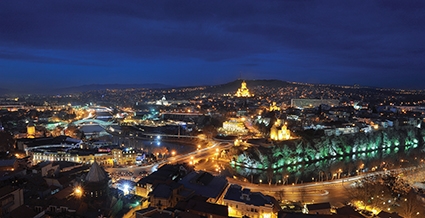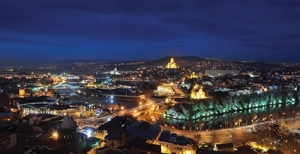Night Life in Tbilisi: City Hall’s New Concept
Tbilisi nightlife needs to undergo an innovation process. It was one of the many promises made by Mayor Kaladze on his ascension to the position. On April 20, City Hall presented a concept plan for developing a night economy in Tbilisi. During the presentation, Sergi Gvarjaladze, head of the project, announced some of the first steps that should be taken in the first 6 months. We picked his brain to find out more about City Hall’s plan.
When was Night Economy first discussed?
Internationally, the phrase Night Economy has been used for maybe 5 to 8 years. In Georgia, the Mayor of the capital, Kakha Kaladze, first mentioned it in his pre-election campaign.
What are the main goals of the project?
The main goal of our project is to create new jobs and support the development of small and medium businesses, especially in the tourism and restaurant sectors. We want to position Tbilisi as a 24/7 city and organize cultural and sports events for a wider group of people.
Which areas will be most affected by the new development?
One of the main goals of our project is to regenerate suburban areas of Tbilisi. Gldani, Varketili, and some other big "sleeping" areas of the city lack cultural life. We aim to change that and to bring new life into these districts. People should have the chance to participate in an active life throughout the city. Another priority is to reuse old, abandoned Soviet-style buildings. Often, they were used for industrial purposes in the past and have since lost their purpose. Sometimes they are referred to as “brown-field,” and upscaling these areas will result in very interesting projects for our Night Economy plans.
Will there be any inconvenience for residents living around the new nightlife hotspots, such as noise or excessive alcohol consumption?
We consider noise reduction as one of the biggest challenges. We understand that we will need to find technological solutions to reduce the disturbance for residents to an absolute minimum. In addition, there are legal issues, on which we need to work to ensure everything follows the rules. Our task will be to mediate between both citizens and those businesses responsible for the realization of the plans.
What are the priorities of the project? Bars? Restaurants? Clubs?
We prioritize all fields of the tourism industry; there is no set priority on one type over another. We also want to create a program with cultural and sports projects for the night time: Night museums, open-air film screenings, night football tournaments... We’re working intensively with representatives of the creative industries to develop unique and innovative events.
What are the biggest obstacles the project faces at the moment? Building permits, etc.?
The biggest obstacle is the range of regulations that the city needs at this point, but also the negative perception of nightlife in general. To change this, we will need to involve the citizens more in the project and correctly communicate its goals.
Does the project incorporate international restaurants and bars as well or will it be focused on Georgian culture only?
Businesses can decide themselves what their focus will be. There won’t be a guideline from our side. If they want to offer international cuisine, they can. But, of course, we also welcome restaurants which promulgate the Georgian cuisine and culture.
* * *
Gvarjaladze seems determined to get things started and we are happy that Tbilisi is set to develop its nightlife by changing its culture. We asked how citizens can apply to open up a restaurant or how the selection process for new businesses will be, but unfortunately, we weren’t given an answer. Sergi Gvarjaladze was also unable to set a date for when the first businesses will open, yet we hope it will be sooner rather than later.
By Benjamin Music











